Green Chemistry Education in the News:
Select a Category
Hexion Announces Digital Teaching and Learning Partnership To Expand Green Chemistry Principles in the Classroom
COLUMBUS, Ohio – (February 14, 2023) – As part of its ongoing support of Science, Technology, Engineering and Mathematics (STEM) initiatives, as well as its commitment to “Responsible Chemistry,” Hexion is serving as a Founding Partner of the Green Chemistry Teaching and Learning Community (GCTLC), a joint initiative of Beyond Benign and the American Chemical Society Green Chemistry Institute.
The GCTLC is a virtual community designed to help transform chemistry education programs across the U.S. and the world. When launched later in 2023, it will be a clearinghouse of peer-reviewed, open-source green chemistry materials including greener lab experiments, lecture materials, classroom activities, and more. The GCTLC will also host online spaces for collaboration, networking, mentorship, and peer-to-peer learning for thousands of educators (including K-12, university and college faculty), students, and industry stakeholders.
Hexion’s partnership with the GCTLC aligns with the Company’s broader sustainability initiatives. “The GCTLC’s principles are framed by the tenets of ‘Green Chemistry,’ which help chemists design more sustainable and less hazardous materials,” said Stephanie Couhig, Senior Vice President, Environmental Health & Safety and Chief Sustainability Officer. “Through this partnership, Beyond Benign will build online spaces and teaching and learning networks that will lead to innovative new solutions to the world’s sustainability challenges. By fostering an broader understanding of green chemistry in students today, Beyond Benign and Hexion are working to enable the research leaders of tomorrow.”
Hexion has steadily increased its STEM initiatives including support for the Future of STEM Scholars Initiative (FOSSI), a collaborative program aimed at creating pathways that allow underrepresented groups to more easily enter and succeed in STEM careers. FOSSI provides opportunities for chemical manufacturers, supply chain partners and industry stakeholders to fund scholarships, provide internship opportunities, and facilitate mentoring and leadership training for students majoring in STEM at Historically Black Colleges and Universities (HBCUs).
“Industry’s support demonstrates their commitment to fostering the next generation of scientists and ensuring that they have the tools needed to design more sustainable products. Hexion’s sponsorship as a founding partner of the GCTLC is essential to launch this important on-line platform and help the educators more easily bring green chemistry to their classrooms and laboratories.” said Dr. Amy Cannon, Executive Director, Beyond Benign.
About Hexion Inc.
Based in Columbus, Ohio, Hexion Inc. is a leading global producer of adhesives and performance materials. Hexion provides specialty products and technical support for customers in a diverse range of applications and industries, such as construction, furniture, energy, agriculture, and automotive. Building on over a century of experience, Hexion is working to preserve the Earth’s natural resources, meet the needs of growing populations and respond to a changing climate. Learn more about Hexion and its commitment to sustainability at www.hexion.com.
About Beyond Benign:
Beyond Benign, a 501(c)3 nonprofit, envisions a world where the chemical building blocks of products used every day are healthy and safe for humans and the environment. Beyond Benign’s mission is to foster a green chemistry community that empowers educators to transform chemistry education for a sustainable future. Beyond Benign is working to equip educators from K-20 with the ability to teach chemistry and STEM through a lens of sustainability grounded in the 12 principles of green chemistry. By providing educators with tools, training and a peer support network, educators are equipped to train the next generation of scientists and citizens with the skills and knowledge to create and choose products that are safe for human health and the environment.
Co-founded in 2007 by Dr. John Warner, the co-founder of the field of green chemistry, and Dr. Amy Cannon, who holds the world’s first Ph.D. in Green Chemistry, Beyond Benign has an extensive history of service. Over the past 15 year, Beyond Benign has trained over 6,500 K-12 teachers in sustainable science and green chemistry, designed over 200 open-access lessons, reached over 35,000 youth and community members through outreach, & partnered with over 100 universities to transform chemistry education. Together we can catalyze the development of green technological innovations that result in safer products and processes in support of a sustainable, healthy society.
###
Hexion Contact:
John Kompa
Hexion Inc.
john.kompa@hexion.com
614.225.2223
Beyond Benign Contact:
Nicki Wiggins,
Chief Operating Officer
Beyond Benign
Nicki_Wiggins@beyondbenign.org

Hexion Announces Digital Teaching and Learning Partnership To Expand Green Chemistry Principles in the Classroom
February 14, 2023
COLUMBUS, Ohio – (February 14, 2023) – As part of its ongoing support of Science, Technology, Engineering and Mathematics (STEM) initiatives, as well as its commitment to “Responsible Chemistry,” Hexion […]
Categories: GCTLC, Green Chemistry Education, Press Releases
Middle School Teacher Greg Sloan on Giving Students a Voice for Change
 Greg Sloan is a teacher at Woodrow Wilson Middle School (Terre Haute, IN) and a Beyond Benign Lead Teacher. In his over 30 years of teaching, he’s seen Green Chemistry lessons enrich his students’ education, giving them a chance to feel that they have the power to affect important change in the world. In this interview, we talked to Greg about Green Chemistry’s presence in his classroom today.
Greg Sloan is a teacher at Woodrow Wilson Middle School (Terre Haute, IN) and a Beyond Benign Lead Teacher. In his over 30 years of teaching, he’s seen Green Chemistry lessons enrich his students’ education, giving them a chance to feel that they have the power to affect important change in the world. In this interview, we talked to Greg about Green Chemistry’s presence in his classroom today.
How have you brought green chemistry into your classroom?
Through the years, I have had the opportunity to develop, pilot, and implement curriculums to help support Green Chemistry education in the middle school classroom. These lessons have allowed students to look at items and events in their everyday lives from different perspectives. There are myriad lessons that allow students to evaluate and question the status quo of product design and development as well as the effects of those processes on the environment. Students identify environmental concerns, seek out alternative options, and propose change. Furthermore, lessons like the ones where students make a bioplastic and create a product prototype allow them to see that their proposed alternatives are viable solutions and a real possibility.
How have you seen students get excited about green chemistry?
A recent activity was to use “Green Chemistry” in a descriptive sentence. A student’s response was, “ I can’t wait to learn more about Green Chemistry because I will be learning how to change the world.” On another question, asking, “Why is green Chemistry important for developing a new way to make things?” a student responded with, “Green Chemistry will be how we save the world. It is our future.” These types of responses are not uncommon once students get immersed in the curriculum. They see the need for change and get excited when they realize that there are simple solutions and that they can be a voice for that change.
Are you working on any green chemistry projects you’d like to share?
I am currently working on a project to bring a multi-lesson, Sustainable Invention curriculum to middle school classrooms. This will be a program that infuses phenomena-based learning, storyline tools, and design and engineering practices into the classroom. This is done by utilizing the exciting energy of green chemistry and the momentum of the environmental change movement to motivate students to explore, learn and love science.
What are your hopes for the future of green chemistry education?
I hope that students continue to become inspired by the possibilities that Green Chemistry holds for the future. I hope educators continue to show students that there are better, more environmentally conscious ways to invent and create. I hope that Green Chemistry careers become commonplace in the workforce. I hope that the term “Green Chemistry” itself becomes antiquated by the sheer fact that it will have become the standard.
What is your favorite green chemistry lab or resource?
It is impossible to have a favorite Green Chemistry resource. However, one of my go-to Green Chemistry lessons is “Cookie Equations.” In this lesson, students visualize that reactants in a chemical equation do not have the same properties as the products. They do see, however, that no atoms are lost; they are just rearranged to form new substances. They do this by using different varieties of sandwich cookies to represent reactants on one side of a chemical equation. Then, they take them apart and reassemble them to represent the products. I tell them they can eat whatever is left over, but they quickly learn about the Law of Conservation of Cookies! Although any lesson that keeps the ideals of Green Chemistry present and prevalent is a tally in the “win” column: a win for the students, a win for the teacher, a win for the Green Chemistry community, and a win for the future!
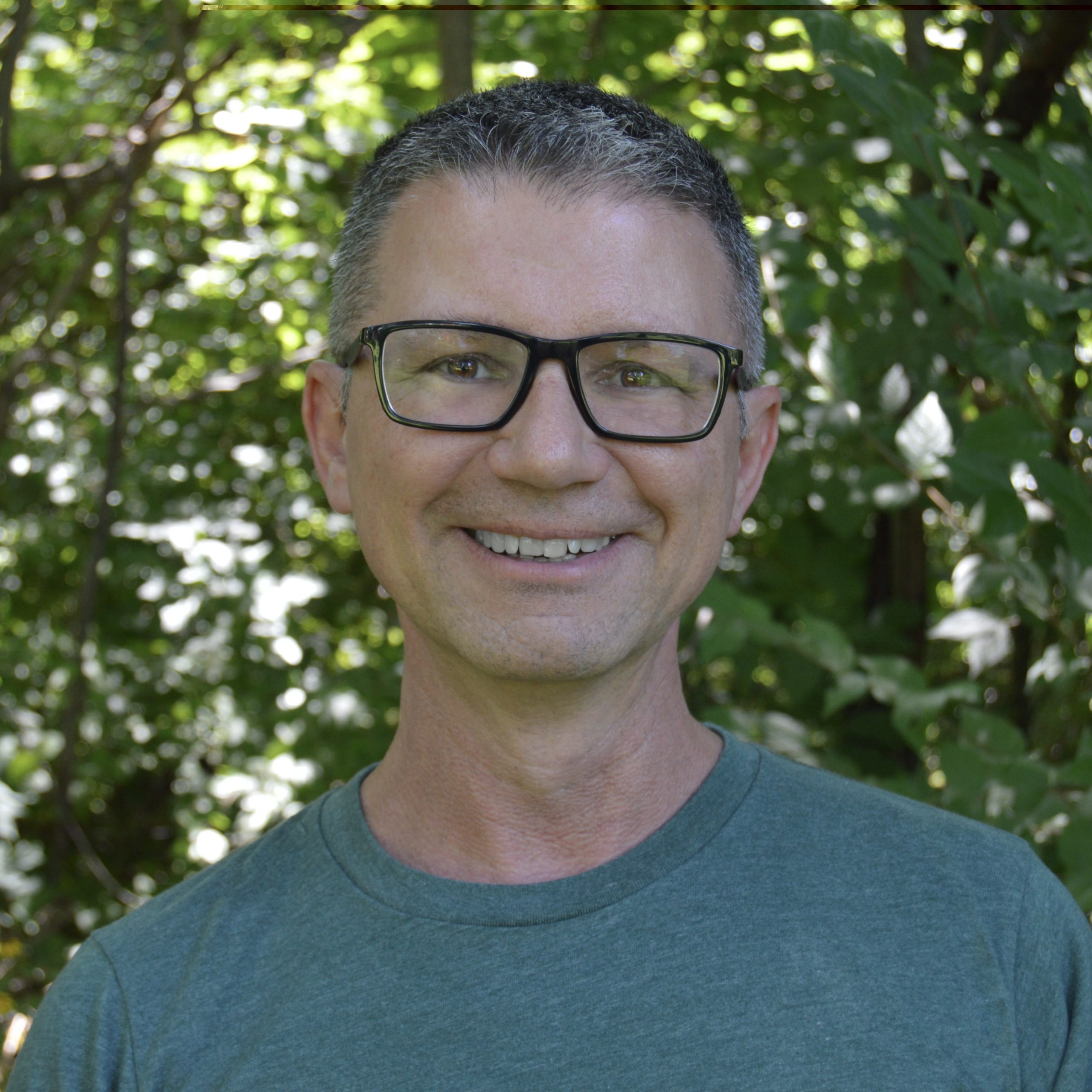
Middle School Teacher Greg Sloan on Giving Students a Voice for Change
January 16, 2023
Greg Sloan is a teacher at Woodrow Wilson Middle School (Terre Haute, IN) and a Beyond Benign Lead Teacher. In his over 30 years of teaching, he's seen Green Chemistry [...]Categories: K-12
Dr. Veronica Mengqi Zhang: Gaining Resources, Support & Opportunities Through the GCC Community
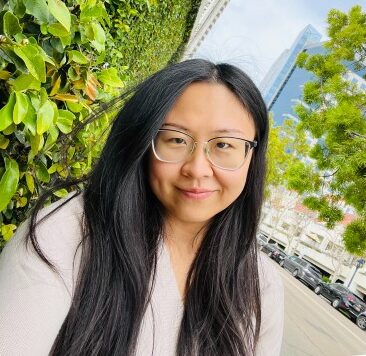
Dr. Veronica Mengqi Zhang
Dr. Veronica Mengqi Zhang joined Michigan State University (MSU) as the Organic Chemistry Laboratory Coordinator and has been working on implementing and refining the reformed laboratory curriculum towards cooperative learning and green chemistry. As a Green Chemistry Commitment (GCC) signer, MSU has prioritized green chemistry education and knowledge sharing for several years.
In this Q&A, Dr. Zhang shares her story about being part of the GCC community.
How did you first learn about the Green Chemistry Commitment?
My first encounter with green chemistry and the GCC was during my Biennial Conference on Chemical Education (BCCE) trip at Notre Dame in Indiana (2018). I attended a symposium held by Beyond Benign. I have been drawn to the concept and this community ever since.
What was the process of becoming part of the GCC community like for you?
The MSU Chemistry Department signed the GCC in 2018, which was before I joined MSU.
The Chemistry Department is committed to implementing green chemistry in its courses, including lectures, seminars and labs. During my interview to become the organic lab coordinator at MSU, they welcomed me as a green chemist after describing prior green chemistry projects I had been involved in as a doctoral student. The transition to including green chemistry as the organic lab coordinator was natural, especially as the cooperative chemistry team at MSU had already laid a foundation of green chemistry in the organic labs.
What has being part of the GCC community done for you as a faculty member?
Being a part of the GCC community allows me to keep up with the most up-to-date developments and breakthroughs in green chemistry in both academia and industries and share this information with approximately 1600 students every year.
Green chemistry is a relatively new but fast-growing field. I am very lucky to be in an institution where there is a vibrant cohort of chemists and researchers in green chemistry and especially Green Synthesis. Being part of the GCC community, we were able to collaborate on multiple projects and make progress as a team.
Any specific outcomes you can share?
MSU has some great green chemistry programs for both graduate students and undergraduate students. The REU summer program focused on Cross-Disciplinary Training in Sustainable Chemistry and Chemical Processes. The Green Cooperative Organic Chemistry Laboratory and Green Chemistry Freshman Seminar aimed to provide students with in-person experience in green chemistry and even field trips to industries on related topics!
Being part of the IUSE team, we successfully implemented a reformed Green Cooperative Organic Chemistry Laboratory curriculum in the 2021 Fall semester and have been making great progress since then. In the 2022 Fall semester, we are incorporating a new Amide Synthesis project into the undergraduate instructional laboratory. The beta testing of this work was sponsored by Beyond Benign and DOW. I am very excited for this new project!
How has being part of the GCC community impacted your students and their ability to prepare for career competitiveness?
My students come from various backgrounds in STEM: Biology, Physiology, Zoology, Kinesiology, Physics, Chemistry, etc. Our curriculum features cooperative learning and green chemistry. We want students to work as a team and tackle real-life problems using crosscutting concepts and scientific practices. Being provided with a project scenario, students will need to conduct experiments like researchers, analyze experimental data, make decisions, and communicate their findings in various scientific formats, all of which will make them more competitive in future career opportunities. Taking the Green Cooperative Laboratory course will hopefully plant a seed in their minds and help guide the direction for their professional development.
How has being part of the GCC helped your institution?
Personally, I was very excited to share our curriculum reform (towards project-based lab and green chemistry) results from MSU with the Green Chemistry Community at Beyond Benign Symposiums in the past year! It’s a great opportunity for connections as well.
In the long run, being part of the GCC sends a signal to researchers and students who are interested in green chemistry that MSU values green chemistry. I was drawn to this position because of that.
Why do you think other institutions should join the GCC?
Resources. Being a part of GCC allows you to gain access to the systematic training in green chemistry, most recent development in curriculum reform towards green chemistry, and numerous connections/symposiums held every month.
Support. GCC is a great community for researchers and chemists who share common academic goals in green chemistry. Knowing that you are not alone on this path is important in the long run.
Opportunities. Interested in future collaborations? Join GCC!
What advice would you give another faculty member about advocating for green chemistry on their campus?
JUST DO IT! You are not alone. Never underestimate how many people you can impact.
What did you share at the BCCE? What was your favorite part?
The topic of my presentation at BCCE 2022 was “Integrating Green Chemistry into the Organic Laboratory using Project-Based Experiments and Case Studies.” It was about the incorporation of the new amide project into the laboratory curriculum and how that echoes with the case study on the same topic.
BCCE conferences have always been my favorite national conferences. I absolutely appreciated the conversations with and feedback from the audience and green chemistry community.
What has the DOW grant allowed you to do that you would have otherwise not been able to do? What impact has it had on you and your students?
The beta testing of the new Green Cooperative Organic Laboratory projects was sponsored by the DOW grant and Beyond Benign. There would not be a new lab project without the DOW grant!
I also want to give credit to the three brilliant MSU undergraduate students I was fortunate to work with on the beta-testing process: Brennan Baldwin, Lillian Centlivre and Morgan Maclean. It is their hard work that led to the success of the test.

Dr. Veronica Mengqi Zhang: Gaining Resources, Support & Opportunities Through the GCC Community
December 1, 2022
Dr. Veronica Mengqi Zhang Dr. Veronica Mengqi Zhang joined Michigan State University (MSU) as the Organic Chemistry Laboratory Coordinator and has been working on implementing and refining the reformed laboratory [...]Categories: Green Chemistry Education, Higher-Ed
Beyond Benign Releases ‘Plate to Planet’ Science-Led Curriculum for K-12 Educators
October 19, 2022 — Driven by a common mission of using science and environmental understanding to help save the planet, green chemistry education nonprofit Beyond Benign and plant-based food pioneer Impossible Foods today announced the release of “Plate to Planet” – a new food and environmental science curriculum for elementary educators.
The “Plate to Planet” module engages students with sustainability lessons relevant to their everyday lives. The interdisciplinary module is designed for educators of grade levels 3-5, focused on explaining the environmental challenges of the global food system. The lessons address topics like biodiversity and climate change, sustainability science, and how food science can be used to inform climate solutions. The goal of the program is to inspire the next generation of problem solvers to imagine how they can play a part in creating change.
The module was developed with a team of educators and piloted by a group of teachers in the 2021-2022 school year. In a follow-up survey, Nicollette LeTellier – a teacher from Swift Water Elementary School involved in the pilot program – said: “This curriculum is essential for building an understanding of green chemistry, biodiversity, sustainability, and our footprint on the Earth.” The student feedback has been similarly enthusiastic, with one sharing: “Wow, I never knew science could be so fun!”
Kate Anderson, Director of K-12 Education at Beyond Benign, led the curriculum development in concert with a team of educators. “It was a joy working with Impossible Foods to create an impactful unit that teaches students about the impacts of food and how green chemistry inventions can help create solutions to such immense environmental challenges.”
Laura Kliman, Director of New Product Development at Impossible Foods, helped support the “Plate to Planet” curriculum development. “Young people are more engaged than ever in the fight to save the planet, and we can do our part to help give them the skills needed to develop sustainable solutions. There’s so much to be excited about when it comes to science, and it’s more important than ever to teach the scientific building blocks of sustainability, especially in the context of our food system. We’re honored to work with Beyond Benign to help inspire the next generation of children and change makers.”
About Beyond Benign:
Beyond Benign develops and disseminates green chemistry and sustainable science educational resources that empower educators, students and the community at large to practice sustainability through chemistry. Beyond Benign works directly with educators and a network of strategic partners focused on science education, sustainability, innovation and initiatives supporting human and environmental health to provide an educational continuum from K-12 to higher education with an important community engagement component.
Media Contacts:
Beyond Benign – Nicki Wiggins, Beyond Benign Director of Development and Strategic Partnerships; (619) 549-1944, nicki_wiggins@beyondbenign.org
Impossible Foods – Megan Collins, PR@impossiblefoods.com

Beyond Benign Releases ‘Plate to Planet’ Science-Led Curriculum for K-12 Educators
November 1, 2022
October 19, 2022 — Driven by a common mission of using science and environmental understanding to help save the planet, green chemistry education nonprofit Beyond Benign and plant-based food pioneer [...]Categories: K-12, Press Releases
Beyond Benign Launches Initiative to Support Green Chemistry Educators at Minority-Serving Higher Education Institutions
October 25, 2022 — Beyond Benign announced a new Minority Serving Institution (MSI) Initiative, designed to provide green chemistry educational support for faculty and students at minority-serving institutions (MSIs). Being built and executed in collaboration with MSIs, the initiative is intended to ensure the next generation of world-class chemists and scientific leaders are reflective of the diversity of the global community and prepared to address sustainability through chemistry.
“It is critical that MSI leadership and expertise is included in the growing green chemistry education community. The inclusion and involvement of institutions that serve students from Black, Indigenous, and People of Color (BIPOC) communities into our Green Chemistry Commitment program is central in ensuring the talent pool of sustainable scientists is diverse and equipped with a diversity of perspectives and approaches that will solve global and local challenges.” – says Dr. Amy Cannon, Executive Director and Co-Founder of Beyond Benign.
The key objectives of this initiative include: partnering with MSI chemistry and science departments, through funding opportunities, professional development and leadership opportunities, to evolve chemistry teaching and practice at their institutions to include green chemistry and sustainable science; building inclusive, diverse community spaces for MSI and BIPOC faculty to collaborate, learn, and share about green chemistry; and engaging and supporting green chemistry student leaders.
The MSI initiative is a critical component of the Beyond Benign Green Chemistry Commitment (GCC) 25×25 program, which seeks to ensure that 25 percent of graduating chemists in the U.S. have a background in green chemistry by 2025. The Commitment program offers higher education institutions a flexible model to expand green chemistry education through their science departments. Through signing the GCC, higher education institutions become part of a broad network advocating for green chemistry education, and gain access to professional development opportunities, funding opportunities, mentorship, peer-to-peer support, and much more.
Through this initiative, Beyond Benign will conduct outreach and discussions with faculty members across a variety of MSIs to better understand the unique needs and challenges they face in incorporating green chemistry into their classrooms, labs, and departments. By bringing their leadership and expertise to the table, MSI faculty will help shape adaptable models to scale green chemistry educational programming for higher education students across the nation. Beyond Benign intends to support MSI faculty in their green chemistry work with resources, peer networks, and funding and professional development opportunities.
About Beyond Benign:
Beyond Benign, a 501(c)3 nonprofit envisions a world where the chemical building blocks of products used every day are healthy and safe for humans and the environment. Beyond Benign’s mission is to foster a green chemistry community that empowers educators to transform chemistry education for a sustainable future. Beyond Benign is working to equip educators from K-20 with the ability to teach chemistry and STEM through a lens of sustainability grounded in the 12 principles of green chemistry. By providing educators with tools, training and a peer support network, educators are equipped to train the next generation of scientists and citizens with the skills and knowledge to create and choose products that are safe for human health and the environment.
Co-founded in 2007 by Dr. John Warner, the co-founder of the field of green chemistry, and Dr. Amy Cannon, who holds the world’s first Ph.D. in Green Chemistry, Beyond Benign has an extensive history of service. Over the past 15 year, Beyond Benign has trained over 6,500 K-12 teachers in sustainable science and green chemistry, designed over 200 open-access lessons, reached over 35,000 youth and community members through outreach, & partnered with 103 universities to transform chemistry education. Together we can catalyze the development of green technological innovations that result in safer products and processes in support of a sustainable, healthy society.
Find us on Twitter, Facebook, Instagram and on LinkedIn.
Press Release Link.
Press Contact:
Nicki Wiggins,
Director of Development & Strategic Partnerships
Beyond Benign
Nicki_Wiggins@beyondbenign.org
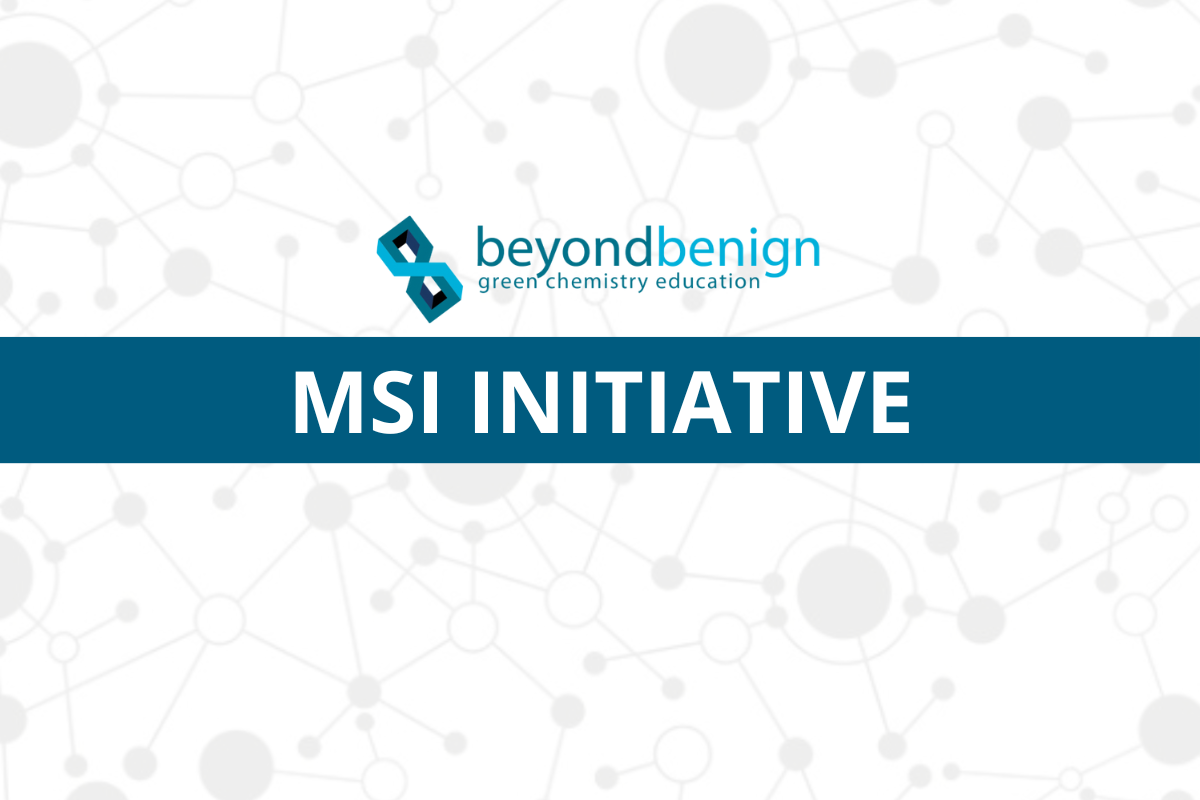
Beyond Benign Launches Initiative to Support Green Chemistry Educators at Minority-Serving Higher Education Institutions
October 24, 2022
October 25, 2022 — Beyond Benign announced a new Minority Serving Institution (MSI) Initiative, designed to provide green chemistry educational support for faculty and students at minority-serving institutions (MSIs). Being [...]Categories: Green Chemistry Education, Higher-Ed, Press Releases
Plate to Planet: Putting K-12 Students in the Sustainable Science Driver’s Seat
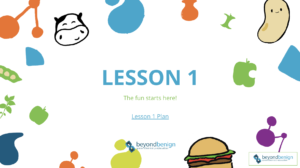
Snapshot from Plate to Planet
Developed by Beyond Benign in collaboration with Impossible Foods and a team of educators, Plate to Planet — a new science-based food unit for elementary school educators — is now officially available. The Plate to Planet module engages students with lessons relevant to their everyday lives to showcase how individual actions can be part of a broader solution for sustainability.
We caught up with Laura Kliman (Impossible Foods Director of New Product Development) as well as Veronica Morabito-Weeks (Beyond Benign Lead Teacher who helped develop Plate to Planet) to discuss why the new curriculum is so helpful in teaching students in grades 3-5 about the challenges of the food system, especially as they relate to biodiversity and climate change.
In Conversation with Laura Kliman
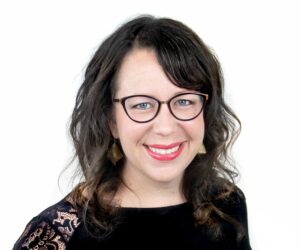
Laura Kliman
What do you think is important about Plate to Planet?
Laura Kliman: The Plate to Planet curriculum is so important because it provides a way for students to engage with real-world challenges — like climate change and its connection to our food system — to learn foundational scientific concepts and standards.
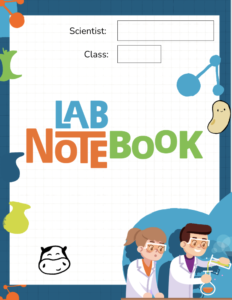
Snapshot from Plate to Planet
The curriculum we helped develop is special in that it puts students in the driver’s seat. The lessons encourage them to become scientists and come up with innovative solutions to real-world problems, creating an understanding of the impact that our everyday choices have on the environment. My favorite part of the curriculum is the yam experiment because it provides that “aha!” moment in which students understand that food is science, and we can use plant-based ingredients in really creative ways to solve scientific problems, all while having fun!
Why did Impossible Foods partner with Beyond Benign on this project?
Laura: Beyond Benign was an obvious partner for us. We share a dedication to sustainability through science, and we were really impressed by their network of incredible teachers who helped us develop a curriculum that will truly work in the classroom for both students and instructors.
Why does Impossible Foods feel that it’s important to create educational materials for students?
Laura: We are on a mission to create a more sustainable global food system and reverse the negative impacts of climate change. To do so, it’s imperative that we create the most delicious and nutritious plant-based meat products while also educating people about the connection between what is on their plate and its impact on the planet.
Students are more curious than ever about what we’re doing to save the planet and how they can help. We want to be part of the movement that gets kids excited about STEM and engaged in being part of the solution. K-12 education is particularly important because around the age of 8, kids start to really think about what they want to do when they grow up, connecting what they learn in school to the real world. Early education is critical to setting the tone and showing students that science is fun and important instead of scary and difficult.
In Conversation with Veronica Morabito-Weeks
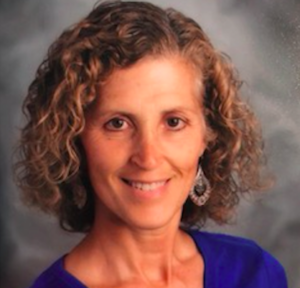
Veronica Morabito-Weeks
Why did you choose to be a part of launching this curriculum?
Veronica Morabito-Weeks: I was thrilled to be asked to create a curriculum with Impossible Foods. It was like a dream come true for me because I already believed so strongly in the company.
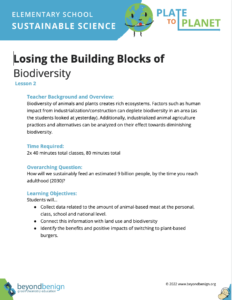
Snapshot from Plate to Planet
It is so important to teach elementary students about sustainability and empower them to make change at a young age. We have a science unit called “The Science of Food,” and I was able to seamlessly mesh this curriculum into our existing unit of study. However, no matter what science curriculum teachers are using — biodiversity, matter, mixtures and solutions, and much more — I feel they would be able to incorporate Plate to Planet.
How have your students reacted to Plate to Planet?
Veronica: My students absolutely loved this curriculum! They really believed they were food scientists and were so engaged in all of the lessons and activities. One of their favorite labs was the Chinese yam lab. They not only had fun with the yam slime, they found innovative ways to use it.
Why do you think it’s important for young people to learn about science from a sustainability perspective?
Veronica: Sustainability is a hard concept for elementary students to grasp but a concept that is essential to our survival. Once they understand it, they embrace it and look for it in many areas of their lives.
My students are currently working on an app design contest tackling sustainability in sports, particularly in large events held in cities, like the NYC Marathon. The Plate to Planet lessons go hand-in-hand with other meaningful projects, and I know my students will be incredible stewards of our Earth. Many have already made a personal pledge to cut down on their meat consumption in an effort to make change. This was not a teacher-directed concept but rather came from their hearts.

Plate to Planet: Putting K-12 Students in the Sustainable Science Driver’s Seat
October 18, 2022
Snapshot from Plate to Planet Developed by Beyond Benign in collaboration with Impossible Foods and a team of educators, Plate to Planet — a new science-based food unit for elementary [...]Categories: K-12
Tova Williams Is Developing Environmentally Benign Dyes and Constantly Learning
Tova Williams, Research Assistant Professor at Wilson College of Textiles, is a scientific trailblazer. A lover of chemistry since grade school, she followed her passion for color to an impressive career in the science of dyes. Her current work centers on designing dyes that are safe and environmentally benign, an exciting area of science that is developing quickly.
 Below, we talk with Williams about her life and work.
Below, we talk with Williams about her life and work.
How did you decide you wanted to pursue a career path in science?
I developed a fondness for math and science while undertaking my grade school classes (and arguably when I was in my mother’s womb, since she often practiced math problems so I would absorb the knowledge early on).
I wanted to be many things growing up, including a veterinarian and a marine biologist. However, after taking my first chemistry course in high school, I knew I was going to be a chemist. My chemistry teacher, Mrs. Carolyn Davila, played a huge role in my decision. Not only was she a phenomenal role model, she was also a phenomenal teacher. She taught the concepts in such a way that not only made it easy for me to comprehend but enthused me about the science. (Fun fact: Mrs. Davila also taught my mothers and sisters and I was one of her last students before she retired)
Thus, I set my heart on joining the Wolfpack at NC State to major in either chemistry or biochemistry. When I discovered an unconventional chemistry degree the University offered, polymer and color chemistry, I made up my mind to pursue this degree. For one, this degree combined two of my loves, chemistry and color, and secondly, the first African American scientist I ever met was a success in this field. The latter was pivotal for me as an African American female, demonstrating to me that I too could succeed in this field. That African American, Dr. Harold Freeman, later became my mentor and played an influential role in me pursuing graduate school and my now faculty role.
What fascinated you about dye and textile-related science specifically?
Prior to joining NC State, I had no clue that my loves, chemistry and color, were so closely related and that a college of textiles existed. In fact, the color of a dye is inherent in its chemical structure.
After I made up my mind to transition into the now Wilson College of Textiles to pursue a polymer and color chemistry bachelor’s degree, I fell in love even more with the degree and the science. I appreciated the practical/hands-on application of what I was learning in the classroom and worked in a pilot laboratory for a year to translate the knowledge into real world applications. This experience later enabled me to pursue different roles in the textiles and other industries to try to solve a variety of challenges such as finding ways to recycle water during textile dyeing to reduce the amount of water used and leached into the environment.
My undergraduate courses gave me a taste of the environmental issues associated with textile and other dyes and inspired me to take a stab at solving these issues. What really intrigued me about polymer and color chemistry was how transferable the hands-on experience was to other areas. Indeed, as a graduate student, I applied the knowledge I learned as an undergraduate to find ways to design sustainable/less toxic hair dyes (or a cosmetic application).
What are some of the unique challenges that the dye and textile industry presents that science and chemistry can help solve?
I am grateful for my experiences in industry and academia, in research and business/sales, to glean different perspectives and challenges. What I have observed over the past years is that there is transformative academic research being conducted in the area of green chemistry/sustainability especially for textiles, such as ways to apply the dyes using waterless technologies.
However, for the research to be translated to industry and applied, it needs to be better showcased from a chemistry/science lens that the technology is practical in this respect. I believe academia can help make the dyes and technologies more translatable and adoptable by demonstrating their feasibility by conducting more pilot lab studies and partnering with industry to do so and ultimately apply things on a commercial scale. Also, clearly disseminating the knowledge to stakeholders is key.
Tell us about your current research. Why have you chosen sustainability as a focus?
I am the Principal Investigator of The Sustainable Dye Chemistry Laboratory. We focus on the design and development of more environmentally benign dyes and application processes for a variety of materials including textiles and human hair. In this respect, we work with both natural and synthetic dyes, and we do not assume either is more sustainable. For example, we study the toxicological effects of both.
We are working on a variety of sustainability-focused projects, including structurally modifying dyes to be able to apply them in waterless dyeing technologies, studying metal-complexable dyes that can be formed using mild conditions and environmentally benign metals, and bioproducing dyes to rely less on petroleum as a resource.
I chose sustainability as a focus for my laboratory because I care about the human health and environmental effects of dyes on a personal level. I was driven to begin research on designing sustainable hair dyes after discovering some of the components used to form the most popular dyes during application could cause a severe allergic reaction for my mother or myself (we used to religiously apply the dyes). Ultimately, I wanted to make hair dye exposures safer for my mother, myself, and other users as well as hair stylists and hair dye manufacturers who also come into contact with the dyes.
Another reason I chose sustainability as a focus of my laboratory is it is such a hot topic area in research, and there are many challenging problems to be solved, especially for dyes. So there are lots of possible research problems to sustain our research program (get it??). I am often approached by very passionate students who want to work in this area and on the projects my laboratory is undertaking.
We read that you are “looking for ways to train nature to solely produce the colorants desired.” Can you tell us more about what this means and your progress?
Certainly! Nature is a masterful synthetic chemist, synthesizing a variety of chemicals including dyes. I want to take advantage of what nature does best and train biological systems to solely produce what is desired (or the dyes).
I am excited to share that I recently was awarded funds from the Comparative Medicine Institute and the Genetics and Genomics Academy at NC State to launch a project soon dedicated to bioproducing naturally occurring dyes for their amenability in waterless textile dyeing processes. This project will bridge the fields of textile (dye) chemistry and synthetic biology and will be done in collaboration with Dr. Gavin Williams’ laboratory at NC State. Dr. Williams’ laboratory focuses on the bioproduction of chemicals for drug applications, so working with dyes will be a great addition to his team’s already outstanding portfolio. We will target a select group of dyes to initially bioproduce using a bacteria host and identifying the genes, pathways, and variants that will enable us to surpass what has been achieved to date.
If you could go back and give your 10-year-old self one piece of advice for succeeding in the world of STEM, what would you say?
I would tell myself to be more confident, especially with what I do know about dye chemistry, chemistry in general, and other sciences. And I would tell myself to have a more realistic expectation that I cannot know everything at once (knowledge comes with time) and to know that I am not unique in this respect to others. No one else knows everything, and we are all in the same boat constantly learning.
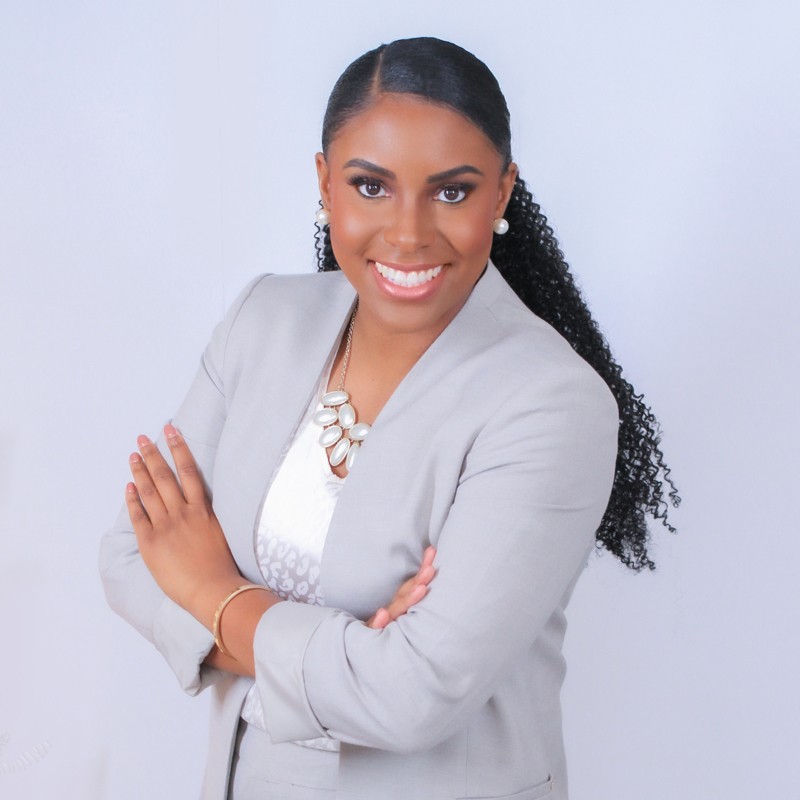
Tova Williams Is Developing Environmentally Benign Dyes and Constantly Learning
October 7, 2022
Tova Williams, Research Assistant Professor at Wilson College of Textiles, is a scientific trailblazer. A lover of chemistry since grade school, she followed her passion for color to an impressive [...]Categories: Higher-Ed
University of York signs the Green Chemistry Commitment
The Beyond Benign team is more than excited to welcome the University of York to our Green Chemistry Commitment program!
Led by Professor Helen Sneddon, the Green Chemistry Centre of Excellence (GCCE) at the University of York is a world-leading academic facility for developing Green and Sustainable chemistry teaching and research through a variety of technology platforms and within its highly successful graduate program.
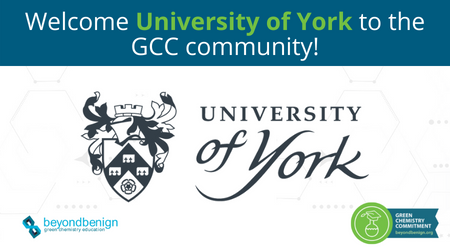 “In an ideal world, Green Chemistry wouldn’t exist as a sub-discipline. We need to move to a way of thinking where sustainability is considered as part of everything we do. Signing this commitment is symbolic of the growing integration of Green Chemistry across all Chemistry teaching and research at York. The next generation of chemists have enormous potential to accelerate the shift to greener chemistry, and it’s an honour to be part of that process.” – Professor Helen Sneddon, Head of the GCCE.
“In an ideal world, Green Chemistry wouldn’t exist as a sub-discipline. We need to move to a way of thinking where sustainability is considered as part of everything we do. Signing this commitment is symbolic of the growing integration of Green Chemistry across all Chemistry teaching and research at York. The next generation of chemists have enormous potential to accelerate the shift to greener chemistry, and it’s an honour to be part of that process.” – Professor Helen Sneddon, Head of the GCCE.
By signing the Green Chemistry Commitment, the GCCE aims to ensure that all students will be exposed to the principles of Green Chemistry and develop the required skills to practice sustainability through chemistry. Visit the University of York’s Green Chemistry Commitment profile and their recent article to learn more about this institution’s steps to advancing Green Chemistry Education!

University of York signs the Green Chemistry Commitment
October 3, 2022
The Beyond Benign team is more than excited to welcome the University of York to our Green Chemistry Commitment program! Led by Professor Helen Sneddon, the Green Chemistry Centre of […]
Categories: Green Chemistry Education, Higher-Ed
Why Chemistry is the Most Essential Science in Addressing Climate Change
By Dr. Amy Cannon, Co-Founder and Executive Director of Beyond Benign
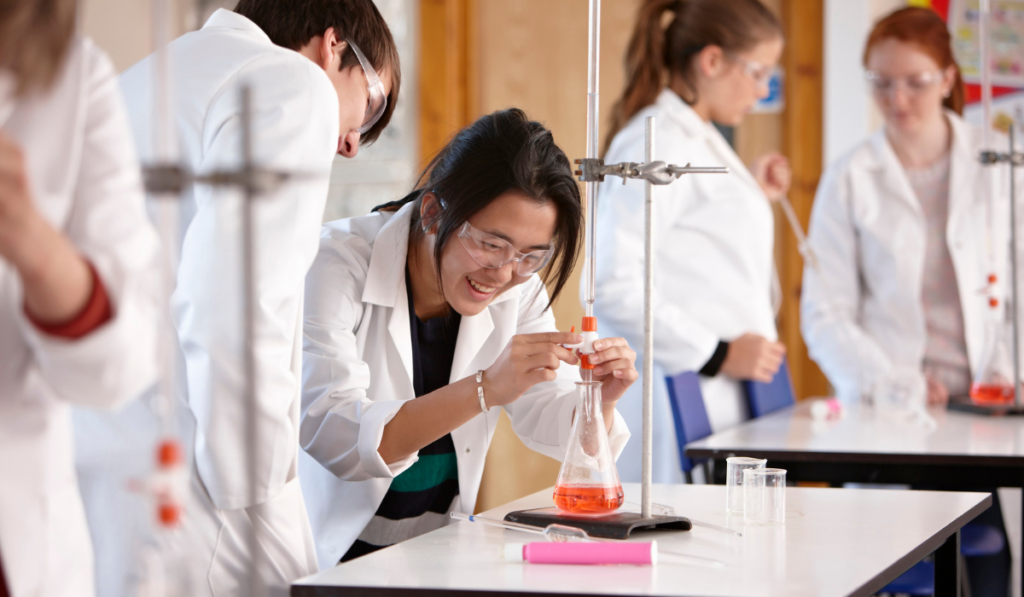
I was asked recently to compare the carbon footprint of a green chemist versus a traditionally trained one. While this is impossible to quantify, it is certainly true that green chemistry training and skills can prepare chemists to better reduce their own impacts. More importantly, it gives them the skills to design chemical products that inherently address climate change. This is the part that excites me most.
Chemistry is often referred to as the “central science.” If this is true, then chemistry must also be the central science of sustainability. It’s chemistry that has the tremendous power to design in and out physical properties. So if we are talking about properties such as global warming potential (GWP), only chemists — through innovative, smart chemical design — can design out this property, therefore creating products that have inherently less (or no!) GWP. No other science can do this. Consumer behavior cannot do this.
This is something only chemists can do.
Green Chemistry: The Science of Tomorrow
Refrigerants serve as a good example of the power of green chemistry to address climate change-related issues. Originally developed in the early 1900s, refrigerants are essential enabling chemical technologies. Over the years, they have evolved from flammable, explosive, or highly toxic gases to highly stable (and persistent) chlorofluorocarbons (CFCs) to hydrofluorocarbons (HFCs), which do not have the ozone-depleting potential of their CFC predecessors but still have high inherent GWP.
In the past two decades, chemists have developed new classes of refrigerants that address GWP through molecular design, creating refrigerants that have minimal or no inherent GWP. One could argue that chemists created the problem in the first place by creating refrigerants that traded off one hazardous property for another. Regardless, chemists necessarily have a lead role in the solution. The power of chemistry is tremendous – that is, if done through green chemistry.
How do we get more chemists trained with green chemistry skills? Education, of course! The better we prepare students with green chemistry skills, the better they will be prepared to use the powerful tools of chemistry to address global challenges — in the ways that only chemistry can. So while we may not be able to quantify the carbon footprint of a chemist, we do know that chemistry is essential to help achieve the Sustainable Development Goals and create a thriving, habitable world for our future.
We have a lot of work to do — now is the time to get involved! Check out the resources below to find out how you can join us.
- Discover our list of favorite resources for educators, both K-12 and higher education
- Learn about and sign the Green Chemistry Commitment for higher education institutions
- Register to join us at our monthly virtual meetings, Green Chemistry Connections
- Get our Green Chemistry curricula for elementary school to higher education
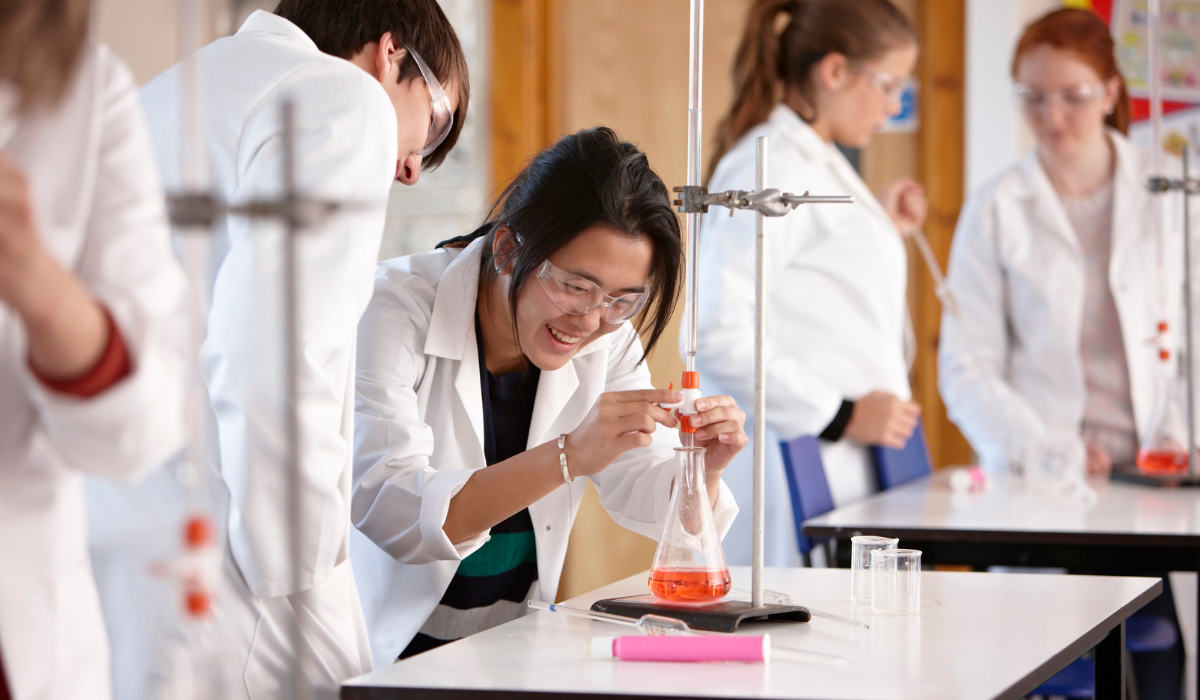
Why Chemistry is the Most Essential Science in Addressing Climate Change
September 20, 2022
By Dr. Amy Cannon, Co-Founder and Executive Director of Beyond Benign I was asked recently to compare the carbon footprint of a green chemist versus a traditionally trained one. While [...]Categories: Green Chemistry Education
- « Previous Page
- 1
- …
- 4
- 5
- 6
- 7
- 8
- …
- 15
- Next Page »
